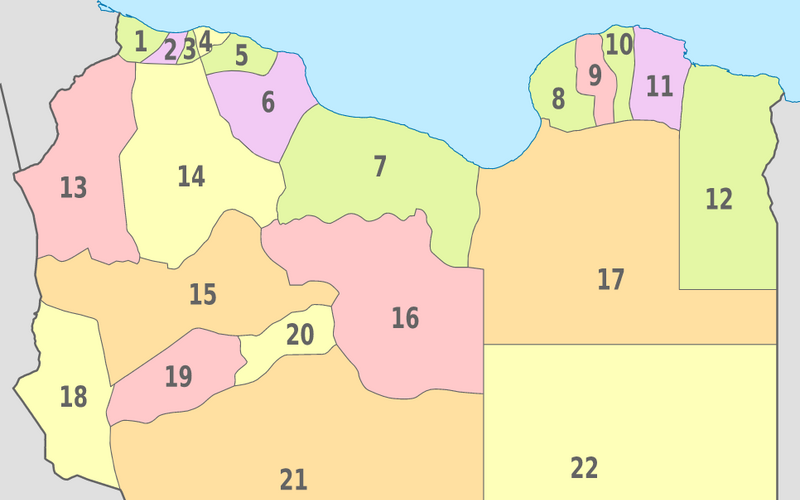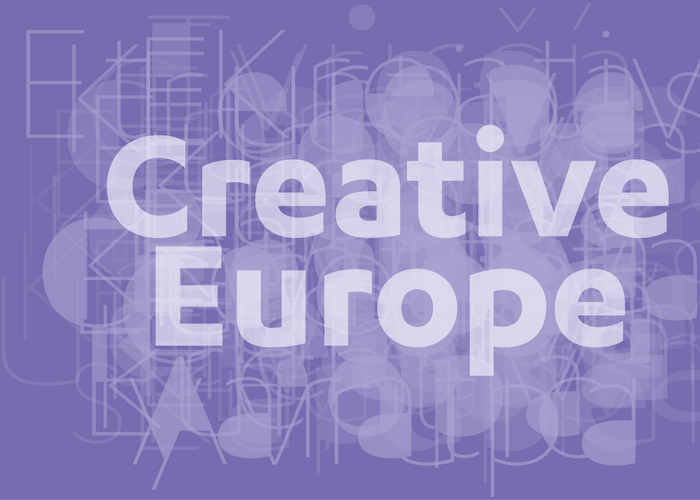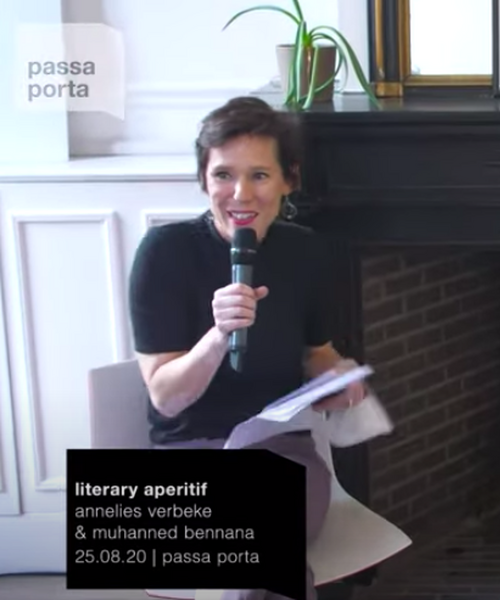In residence : What is My Place? - presented by Annelies Verbeke

“I met Muhanned Bennana in the spring of 2018 in the Sans Souci Library in Brussels. I was co-teaching the first creative writing workshop organized by my colleague Sulaiman Addonia for people with a refugee or asylum-seeker background. Muhanned and I later became friends and met regularly in Ghent, where we both live. It was clear to me from the start that Muhanned – who had fled Libya where, as a critical journalist, he was in real danger – had a great talent for poetical prose. There is an urgent quality to what he writes. It is dark and yet dreamlike.
Since that quality sometimes tends to render the content somewhat opaque for the reader, I tried, as we emailed back and forth, to focus on the essence of what he wants to tell. And on his answer to the question put to him, “What is your place?” The first text he wrote in constructing the one below was about writer’s block – reality being too overwhelming to be put into rational words. He wanted to create a whole world. I suggested he start with a single house.
He begins with the house where he grew up in Libya, develops it into a country and more than a regime of oppression that forced him to be an eternal outsider, with even his language taken from him. I think Muhanned Bennana voices his experiences magnificently. His story deserves to be read.”
Annelies Verbeke
_
My place is where everyone knows the stories of others. But I have moved away from my purpose since I began writing. The more I think about it, the more I drift away. Thinking has poisoned my thoughts, but has also helped me to realize that some questions need more time. Answering the wrong ones leads nowhere – or at least, to the wrong place.
The question revealed my vulnerability and made me feel the shame of having no tangible place. It has almost become part of me, a bandage stuck on an old wound. I could see it as I can see the sun at the end of the road, but the road did not lead me to the sun – or to my place.
The moment I decided to welcome strangers to my place, that place collapsed on itself. A stage of ruins that I cannot erase. I play with words to hide the fact that I have only false maps. The place is missing. But its foundations lie in small pieces that one day will come together.
The first piece of my place is the house where I came upon my first book. It was fragmented and untitled. Twenty years later, I discovered that it was written by the Leader. The book was one of the objects that helped me to characterize the house.
*
It was not even clear in its original language. We simply called it The Great.
In our house, colours meant one colour, and mankind always consisted of men. Even God was a hidden man. Feelings were lip-synced from songs, love was watched on soap operas, freedom was embodied by shiny banners, meanings were overturned, words were deceptive, and practices were primitive.
Our house still possesses the spirit of a Bedouin tent. The cold concrete structure is nothing but a vacuum of minds filled with grey roads that suddenly tore up the ground after oil was discovered. Our ephemeral wealth is a natural coincidence that has become a curse. Our house is where man discovered how to extinguish fire! A place where darkness had a colour. An indoor desert with a sealed door.
In the beginning, family members were mesmerized by the voice and utopian speeches of the Leader. They were involved in his plans to fight the enemies of the Revolution by creating different bodies such as The Revolutionary Guard Corps, with one motto: ‘No revolutionaries outside revolutionary committees.’ They were trapped in the Leader's fantasies.
The Leader established a ‘Third World Theory’ and set out its foundations in The Green Book. It provided solutions to humanity’s dilemmas. For example, ‘Solving the Problem of Democracy’ by hanging those who advocate political parties. ‘Solving the Economic Problem’ by spending oil money and renaming foreign products: Philips became Garyunis, the name of a battle against the White invader. Everything in his 180-page pamphlet was printed in a large font and with wide margins. On the back cover, the publisher wrote: ‘This book is unequivocally the beginning of a social revolution that offers a true interpretation of history and a solution to human conflicts.’
Before publishing his Book, the Leader ordered the closure of libraries, the burning of foreign books, and a ban on teaching foreign languages (including my mother tongue), thus announcing ‘The Cultural Revolution’. Later, monuments made of three concrete books were erected on every corner. The Leader also renamed the calendar: January became ‘The Month of the Fires’, and September, the month in which we started painting in green, became ‘The Month of the Conqueror’.
We had one TV channel. We called it ‘The Hedgehog’ because it looked like a half sun surrounded by Arabic letters woven with Islamic decorations. And it had one show, The News, which for decades repeated the same news, accompanied by lyrical pieces glorifying the Leader followed by many of his titles: ‘The Colonel’, ‘The First Teacher’, ‘The First Athlete’, ‘The Messenger of the Desert’, ‘The Leader of the Revolution’, ‘The Brother Leader’ and ‘The Only Falcon’.
The News always featured letters of appreciation, gratitude and support for the Leader’s universal vision. It worked to spread as many negative stories as possible about the rest of the world, about ‘all those who live in a state of slavery under martial capitalism and false democracy.’ Epic songs comforted us by reassuring us that the house was in its heyday. The Leader was always winning, and his family lived in eternal happiness and prosperity. The verses of loyalty became our childhood memories.
In the morning line-up at school, we had to recite The Green Flag Call:
I was out of place. My language was called a disease, one that disrupted the unity of the house. I was made to recite the following: ‘The language of the house is the language of God, the language of the afterlife, and the language of his book.’
The Green Book became a Green House. In the national museum, the Leader’s car was placed among the artefacts of ancient civilizations. In the Month of the Conqueror, I had the chance to look up at the sky to see green fireworks and a chain of small green flags. The walls of our house were painted green, the windows covered by grass-green curtains which blocked any view of the changing seasons. Our plants were painted a plain green. What, I wondered, was the colour of the exterior?
In the house, everyone had to believe that we were actually not from here. We had migrated from the East, from the home of the nobles. Everyone had to believe the myth that this house had no original owner: everyone was a foreigner. The only direction that people were allowed to come from (in history books) was the East.
I had to be quiet, but I had a million questions, and I just wanted someone to give me good answers. But asking questions did not make any sense. I was a guest among those who stole the word ‘we’ from my language. And because I could not save ‘us’, I had to try to save ‘I’. Everything was toxic, and no one could escape the hatred. My family considered me insane. All questions were answered absolutely, but at the same time, they were not. There was an emptiness in those simple answers. The present was merely used to reintroduce the past.
The rest of the world for some reason was angry with us. The house was closed from both sides. Meanwhile, we coloured bananas blue and the Leader wrote an article about whether death is female or male. The house always had the smell of fresh paint. ‘Sons of the Revolution’ were always painting cracked walls and broken floors. They thought that painting could fix anything.
In his article ‘Long Live the State of the Wretched!’, the Leader writes:
It was a powerful mirage of delusions.
When a boy was born, he would be nameless until the People's Congress approved his name. The name should conform with the language and identity of the Leader. And so the Leader ordered a list of banned names to be drawn up. Those who chose native names would remain unregistered. To get an ID card, everyone had to give up his identity. Those who believed that the house was more than its current wallpapers were denounced as outsiders. They were muted. But the unregistered acquired knowledge from cautious small talk and overlooked signs.
Nothing was fixed. In the living room we had an ancient statue, but the Leader decided to take it down because it represented a ‘foreign identity'. He kept the marble stone base and wrote on it: ‘This site will be dedicated to a figure that symbolizes the state identity.’ Decades later, it is still empty.
In the house, the deepest fear was that of the known. People were dying in secret, and their children had to live as if their parents had never been. The statement of death in itself was a crime. It was an acknowledgement of opposition.
The Leader decided to demolish prisons. The next morning, we had so-called rehabilitation centres. The era of socialism was at hand! We wore the same clothes, had the same toys, ate the same breakfast, worshipped the same god. Being the same was a necessity.
My existence was a forbidden possibility where I had to watch outsiders pass down their history, their heroes and their enemies as mine. It was inconceivable, and I did not know why they were doing so. I was filled by the void of not being. But I waited, believing that the grass was not greener, and again I wondered: why are some stories more important than others?
The Leader was not happy to be limited to one house. So he provoked his loyalists to occupy a strip of the neighbour’s yard. Thousands marched into the middle of nowhere – a place where maps were used to get lost. The prophecy of the Leader failed. His sons were thirsty and lonely roaming outside. Silence followed a defeat that was never recognized.
One day, some men decided to take control of their house. Unfortunately, they could not kill the monster they had created, and it was impossible to hide inside! Some of them were crushed in garbage trucks. The rest were killed and their bodies were kept in a morgue for twenty years. They were never buried.
The prisoners of one of the darkest places demanded a trial, demanded the right to see the sun, to see other humans. The Leader responded by burning the prison and shooting the survivors. Their bodies were buried in the backyard. After several years, they were excavated, only to be burned in an oven for days.
The colour green started to fade. The Green God was dying, and now everyone had become a god. Another Revolution added another two colours. The Leader embodied the unity of the house. Oppression was the glue that kept everything together. And green was an irrevocable smear.
The people were divided into ‘Rats’ and ‘Algae’. Those who rose against the Leader, and those who continued to believe in a false religion. As a result, I had to escape this inevitable suicide.
I believed I would be free when I left, but I was not. The house was like the outside. Nothing changed except that now I need to experience it again. My house is a place that I need to revisit to make sure that I still exist. And my place is a house that is forever falling. Memories want to be told.
So what is really my place? Perhaps it is the moment when I smile at the faces of those who try to remember who they were before being labelled.
Muhanned Bennana, Brussels/Ghent, 2020


